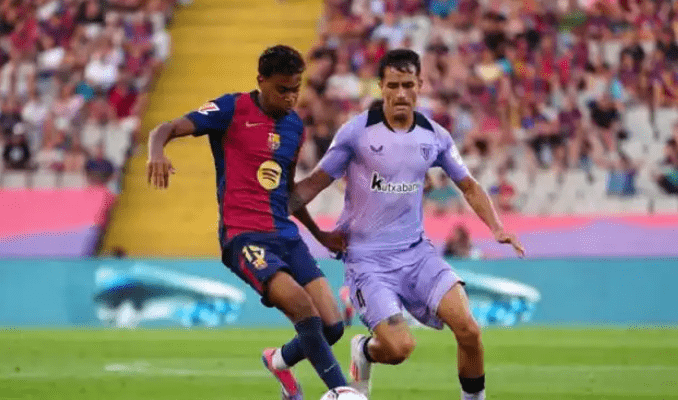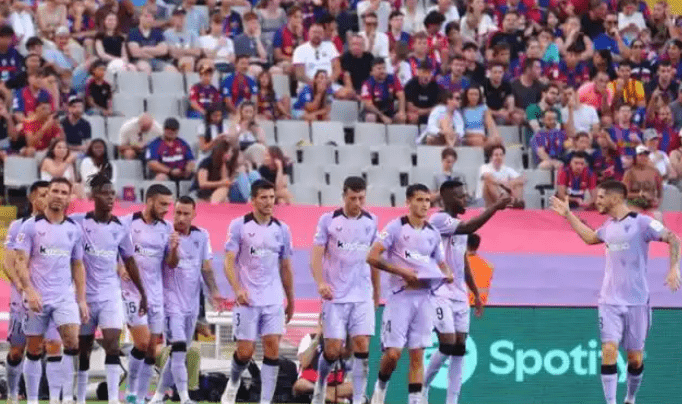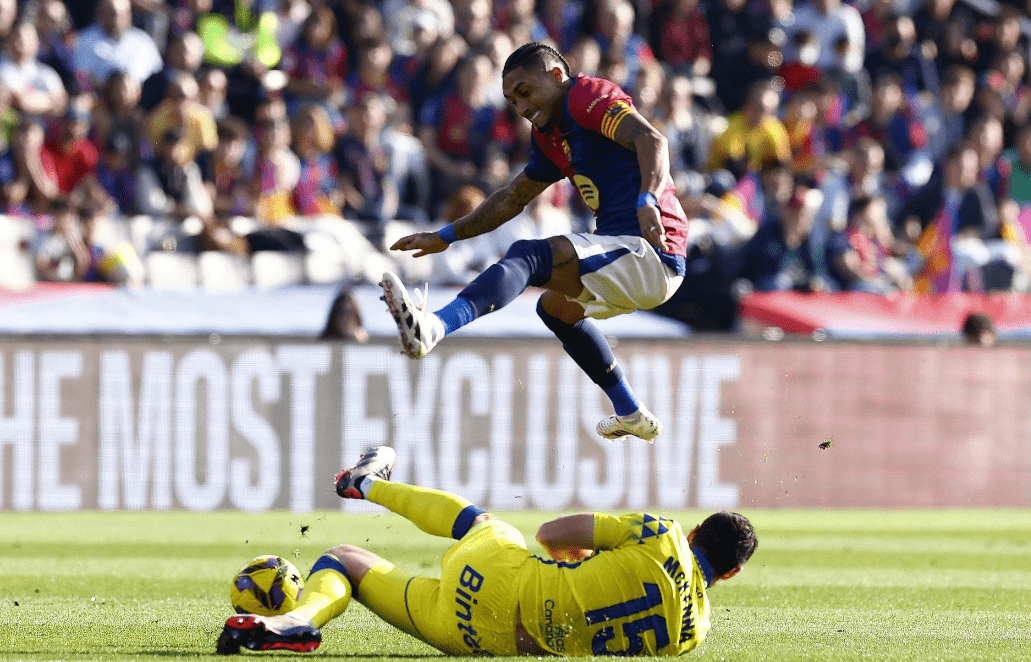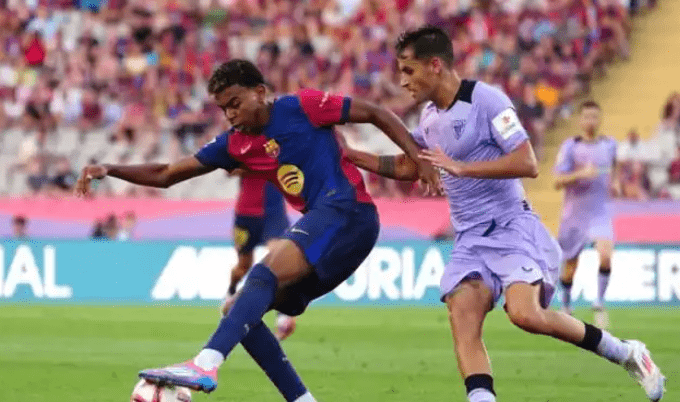In the La Liga arena, Barcelona suffered a 1-2 defeat to Atletico Madrid. This loss may seem like just a single game's failure, but it is actually the concentrated outbreak of a series of problems. The team experienced its first loss in five years, which seems to be reminding everyone that Barcelona's current situation is not as glamorous as it appears on the surface. Why has this once world-renowned team become so vulnerable? What caused them to fall from their peak and struggle on the road to the championship?
To highlight the bright spots of Barcelona this season, one must mention the "youth storm" from La Masia. Young talents such as Ansu Fati, Gavi, Pedri, and Ferran Torres have indeed impressed with their performances. Under Xavi's promotion, they have stepped onto the stage, proudly displaying the name of La Masia. This is an exciting feeling that has been long-awaited, as the youth academy is the lifeblood of Barcelona, and the emergence of these young players has once again ignited fans' confidence in the future.

However, problems have arisen alongside this youthful energy. Youth is a double-edged sword. The young players' determination is commendable, but their lack of experience has led to frequent failures in key matches. For example, in the match against Atletico Madrid, young player Ansu Fati struggled to adapt to the pressure, directly leading to a loss of control in midfield.
Combined with injuries to players like Ousmane Dembele, the shortcomings of the youthful lineup are magnified - they may represent the future, but they are clearly not yet strong enough to support the present.

La Masia is like a ladder that has lifted Barcelona out of the trough, but it also reveals the problems of walking on a bumpy road. This indicates that relying solely on the emergence of talented young players is not enough to solve all problems, and it may even complicate them further.
Leaving aside the youth academy, it is hard to overlook the core of Barcelona's frontline - Robert Lewandowski. This nearly 35-year-old forward has proven the value of the phrase "a sharp knife never grows old" with his incisive performance. To date, he has contributed 25 goals, single-handedly carrying half of the team's sky.

However, things that are too "useful" often hide risks. It seems that the entire Barcelona offense revolves around Lewandowski, and this over-reliance has almost eliminated the diversity of the frontline. If Lewandowski, this "universal card," encounters issues such as a drop in form, excessive physical exertion, or injury, the entire team's offense will be like a machine without oil, completely paralyzed.
What is most concerning is that when Barcelona lost to Atletico Madrid, Lewandowski remained inconspicuous but was still the focus of the opponent's defense. Atletico Madrid took advantage with a more diverse tactical approach, firmly grasping the initiative. In contrast, Barcelona could only rely on the traditional combination of Lewandowski and Rafinha, a strategy that becomes less certain when facing more cunning and layered opponents.

When Xavi took over the reins of Barcelona, he inherited a team that was empty in all aspects and riddled with injuries. The mess left behind by his predecessor and the financial crisis became a "gift" for him. Xavi's choice was to implement a youthful reform. He overcame objections and boldly promoted the "children" of La Masia, piecing together a new Barcelona with young players and some experienced veterans.
This strategy did work in the short term. A winning streak at the beginning of the season made people mistakenly believe that Barcelona was steadily on the path to revival. However, as the season progressed, problems arose. Waves of injuries knocked on the door, and tactics failed to stabilize. This is akin to building a house without a strong foundation; no matter how beautiful the newly built skyscraper looks, it will sway and crumble when hit by a storm.

Ultimately, Xavi is a smart man, but he is also helpless. The paths of youthfulness and championship contention are destined to be a pair of "enemies." Wanting both immediate results and laying the groundwork for the future is inherently greedy. Moreover, in a place like La Liga, competitors show no mercy.
When others are down, there is always someone who stands up. During Barcelona's low point, Athletic Bilbao quietly rose. With solid defense and sharp counterattacks, they achieved an impressive record of 14 unbeaten games, becoming a "fighter among dark horses." More surprisingly, they could perform freely in the Europa League, as if they had an inexhaustible supply of ammunition.

Compared to Barcelona's monotonous attacking style, what makes Athletic Bilbao enviable is their "multiple points of attack." When names like Alex Williams, Iñaki Williams, and Iker Muniain frequently appear on the scoring charts, Barcelona's frontline relies on one or two individuals to struggle. This contrast is too obvious; it feels like one team is "group attacking," while the other is "fighting alone."
During the winter break, Barcelona also staged a farce - the registration issue with Ferran Torres. This key player was unable to register and join the team due to management errors. This not only reduced Barcelona's combat power on the field but also exposed their messy financial and management situation to the outside world. Players are disheartened, morale is low, and this negative impact is like a cold wind in winter; one gust might be okay, but too many can chill a person to the bone.

When "management chaos" appears within the team, the surface problems are often just the tip of the iceberg. This is like complaining about too little oil while cooking, but you should first check if your home is already out of oil.
To sum up, Barcelona's current situation is a mix of joy and worry. The potential of La Masia's youth training is undeniable, but reality is also cruel - the current Barcelona is clearly facing both internal and external troubles. Problems such as frontline fatigue, management crises, and a decline in midfield control are not insignificant.

How to move forward in the future, in the short term, Barcelona must stop the decline. They need to find solutions in terms of frontline configuration and defensive stability to pave the way for the championship throughout the season. In the long term, they need to resolve the issue of financial construction to avoid this "robbing Peter to pay Paul" overdraft model.
Regardless, Barcelona, this lion, has never backed down. They will continue to fight, though this time the road to the championship may be more difficult than usual.